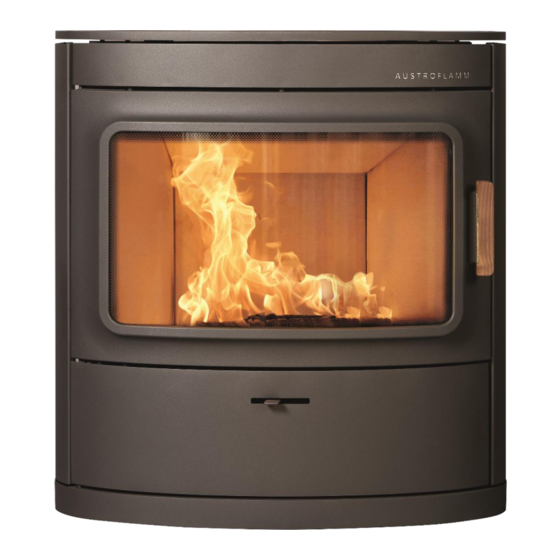Austroflamm CODY Інструкція користувача - Сторінка 8
Переглянути онлайн або завантажити pdf Інструкція користувача для Дров'яна піч Austroflamm CODY. Austroflamm CODY 20 сторінок.

Cody
Combustion air
Being the user of the stove you must take care of a sufficient
combustion air supply. Sealed-up windows and doors may
not allow a sufficient combustion air supply or disturb the
draught behaviour of your stove. Please ensure the additional
supply of fresh combustion air if necessary. For details please
consult your specialist retailer. Make sure that the
combustion air intakes are not blocked!
3. CORRECT OPERATION OF YOUR STOVE
Approved fuels
Dry, well cured and natural wood (hardwood preferred), wood
briquettes.
Maximum amount of fuel
Maximum amount of fuel to be added: 2 kg wood or 1,8kg
briquettes. Larger amounts of fuel can lead to overheating
and thus damage the stove.
Clean burning
The wood must be dry (relative wood moisture < 20%) and
untreated and the right amount of wood must be burned in
order to ensure a clean fire that releases only small amounts
of emissions.
Startup procedures
During the first 3 - 4 operations - at nominal heat output -
there may be some odour development and the varnish has
not yet hardened.
Making a fire
For the correct and safe operation of your stove please pay
attention of the chimney developing the necessary feed
pressure. This must especially be considered before the
initial operation (or e.g. after the summer heating break) and
during the mid-season heating periods (e.g. at strong wind,
etc.). If there is not enough feed pressure, please light only
some paper or small kindling first, in order to "warm up" the
stove and the chimney.
The air inlet must not be covered or closed.
Clean grate, empty ash drawer if necessary.
(watch out for ambers)!
Position the lever for the combustion air to the fully open
position (see Fig. 7).
Place 2 - 3 logs (approx. 1,3 kg in total) crossways in the
combustion chamber (1) with sufficient distance from each
other (min. 2 cm), on top of that place some softwood
chippings (approx. 0,5 kg) (2) and some ignition aid and light
(3) (see fig. 5).
Fig. 5: ignite the fire
6
3
2
1
Stove pipe connection
For your own safety stringent laws apply for connecting the
stove pipes to the chimney. Your professional dealer or
distributor knows these laws. Please have your certified
retailer carry out the connection of your stove.
We recommend to let the first load burn down without
changing the air lever position.
As soon as no visible flames are left (only embers in the
combustion chamber), you can put another load of logs
(approx. 2 kg) in the combustion chamber if desired.
When reloading the stove please repeat the procedure as
mentioned under "first lighting": air lever to open position,
open door carefully, place logs, close door.
After a few minutes, when the logs burn well on all sides
(bright, high flames – see fig. 6), you can adjust the heat
output with the air lever (see fig. 7). The flames should be
yellow and never look blueish or have black tips (otherwise
add more air – see fig. 7). Never close air supply completely
during operation (danger of flash-fire).
The stove door may be opened only for refuelling or disposing
of ashes and is to be closed again afterwards.
Fig. 6: flames
Heating in-between seasons
If you heat the stove in between seasons, when the outside
temperatures are higher, the flue gases may not be able to
escape completely and this may lead to disturbances in the
chimney draught, especially if the temperatures are rising
suddenly. The stove has to be charged with less wood then
and the primary air has to be increased so that the wood can
burn down faster (with visible flames) and thus the chimney
draught can stabilize.
Chimney fire
A chimney fire may occur, due to sooting and deposits in the
chimney, if impropes or humid fuel is used. In case of a
chimney fire close all air inlets on the fireplace/chimney
immediately and call the fire brigade. Please have an expert
inspect your chimney for cracks and air-tightness after the
burning out of the chimney.
english
Fig. 7: air slider knob
open → closed
